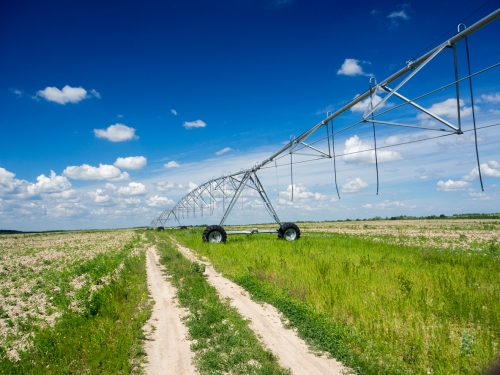
A pivot is only as good water allowed to run through it
If you own farmland in a Natural Resource District in the state of Nebraska, then the case of Prokop v. Lower Loup Nat. Res. Dist., should give you pause. Robert Prokop has operated a farm since 1962 in Nance County which falls within the regulatory territory of the Lower Loup Natural Resource District (LLNRD) of central Nebraska.
The LLNRD is authorized to regulate farming operations that may contribute to ground water contamination. (Neb. Rev. Stat. § 46-707 and § 46-704). Pursuant to its authority, the LLNRD requires farmers to submit detailed annual reports regarding their farm, including; (1) the number of acres; (2) expected yield; (3) nitrogen readings and application; (4) water applied (5) irrigation date, and (6) actual crop yield. (LLNRD, Rule 7). It might strike you as odd that a Natural Resource District requires actual crop yield data for preventing contamination of ground water. But, the LLNRD has its reasons and the Nebraska Supreme Court agrees.
Mr. Prokop decided not to comply with the LLNRD’s annual reporting requirements by refusing to include actual crop yield data. Consequently, the LLNRD sued Mr. Prokop for operating illegal wells and failing to submit completed annual reports for 2010 and 2011. The Nance County District Court ordered Mr. Prokop to provide the required reports to LLNRD.
In 2015 and 2016, Mr. Prokop violated LLNRD’s annual reporting requirements again. He failed to provide all of the required information, including actual crop yield data, irrigation data, nitrogen application and – worst of all–he neglected to sign and date his reports. Due to Mr. Prokop’s ongoing violations, the LLNRD filed a complaint against Mr. Prokop and notified him of its intent to issue a cease and desist order and impose penalties. At the hearing the LLNRD board gave Mr. Prokop additional time to submit his annual reports. Unfortunately, he failed to do so and proceeded to defend his actions by stating he “has long taken the position that LLNRD’s demand that farmers provide actual yield information is unnecessary from a scientific standpoint and the request for such information is a governmental overreach not allowed or required by law.”
Thereafter, Mr. Prokop was ordered to cease and desist use of all groundwater for irrigating his crops for a period of four-years, which Mr. Prokop appealed. The district court agreed with the LLNRD’s board’s decision and determined the annual reports serve a substantial and legitimate government interest in preventing ground water contamination. However, the court ruled the four-year penalty was an unreasonable restriction. Therefore, the court modified the suspension to one-year.
Not leaving well enough alone, Mr. Prokop appealed the case to the Nebraska Supreme Court. LLNRD cross-appealed arguing the orginal four year suspension was reasonable. Nebraska’s highest court agreed that actual crop yield data is helpful to reduce nitrate contamination. Coupled with other farming data, crop yields can help determine the amount of nitrogen removed from a farmer’s fields. The Nebraska Supreme Court also determined that the district court’s decision to modify the suspension to one-year was not unreasonable or contrary to law.
The takeaway, as a farmer with land in a natural resource district, you can be subjected to severe penalties for failing to submit annual reports with ALL of the required information. Mr. Prokop’s defiance is a lesson of what NOT to do. Word to the wise: submit your annual forms, provide the requested information, sign your name and continue to have access to groundwater to irrigate your crops.


Leave A Comment